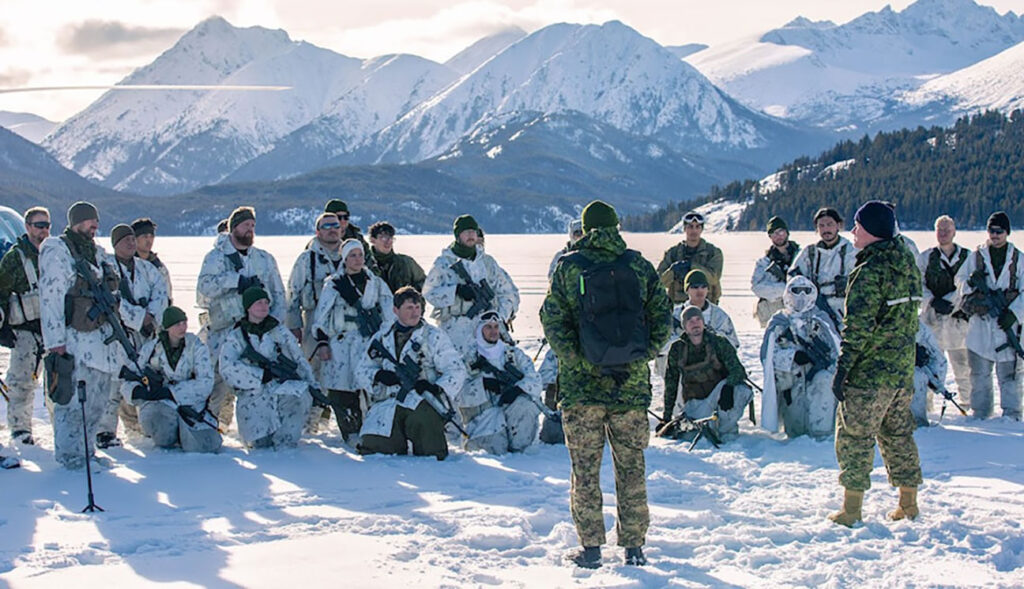Members of the Canadian Armed Forces conducted an annual winter training exercise, Arctic Bison, in the Yukon Territories in February 2025. CANADIAN ARMED FORCES
THE WATCH STAFF
Canadian Armed Forces (CAF) Soldiers conducted annual Arctic readiness training in the Far North in February 2025, training with Japanese Self-Defense Force Soldiers and strengthening bonds with Indigenous communities in the Yukon Territory. The Arctic Bison exercise involved elements of the 38 Canadian Brigade Group, the Winnipeg Rifles and cultural exchanges with the Carcross Tagish First Nation, according to the Yukon News, a Canadian newspaper.
The operation focused on demonstrating task competencies in extreme conditions, including handling weapons and providing medical treatment. “We need to validate every 12 months in the Arctic, and we validate with a set of what is called battle task standards,” CAF Lt. Col. Piotr Sliwowski told the newspaper. “So, we have individual task standards like knowing how to do first aid and knowing how to shoot straight on a target, but then we have battle task standards that apply to the entire unit, and we need to check those battle task standards off, not necessarily in sequence, but to achieve all of them.”
Arctic Bison involved about 80 CAF Soldiers and officers with the 38 Brigade Group and was held for the first time in the Yukon Territory in northwest Canada, bordering Alaska. Previously, Arctic Bison took place in the Northwest Territories to the east, where the Brigade Group is based. Carcross was chosen for the 2025 iteration to provide experience in new types of terrain. Instead of the foothills and water bodies common to the Northwest Territories, Carcross presented more challenging terrain. “We’ve done foothills in Alaska, plenty of lakes and a big Great Slave Lake exercise. It’s time for us to change up the terrain and do something much more complex. We started doing map reconnaissance using Google Maps and other tools, and we determined that Carcross was probably the type of atmosphere and terrain we were looking for,” Sliwowski said.
CAF Maj. Sean Fischer said CAF reservists with the Brigade Group practiced routine military tasks specific to the austere conditions, giving them operational capacity in a harsh environment. “We have a number of what we refer to as battle task standards that we have to be able to do in an operational environment in order to function,” Fischer told the News. “That translates from a tactical environment to a domestic environment as well. Those are things like communication, moving, self-sustainment, all of those things. We had, in this case, a couple of snowmobile rollovers where we sustained some injuries, and we were able to manage those internally and bring people back as required.”
The exercise also provided an opportunity for Japanese and Canadian troops to train together with two lieutenant colonels from Japan’s Ground Self-Defense Force participating. “Northern Japan gets probably just as much snowfall as Yukon does. We learned a lot from them as well (Japanese Ground Self-Defense Force), because we do what we call an after-action review after every attack and every major maneuver, where we kind of pause tactically, get everyone together and have those discussions; points to sustain, points to improve on,” Sliwowski said.
The CAF also worked closely with the Carcross Tagish First Nation. Advance teams traveled to the area in the summer of 2024 to coordinate with Indigenous communities. The preparation paid off with Indigenous community members assured that the CAF would respect the land and local traditions. “We did our initial planning conference at the end of the summer and then we sent out advanced reconnaissance to physically come here during the summertime. So, my leadership got to meet the community and talk to them about what we intended on doing,” Sliwowski said.

